


















Welcome to King Henry VIII Sixth Form.
Our Sixth Form is a vibrant and dynamic environment where students enjoy their learning and are encouraged to work hard to achieve their goals.
We balance strong academic support with increasing independence to ensure our students develop the skills needed for successful A Level grades but also life beyond school.
Our students go on to attend the very best universities and are successful on prestigious degree apprenticeships. I am very proud of our students who leave us well prepared for the challenges ahead.
Mr Philip Dearden, Headmaster
We pride ourselves on the academic achievements of our Sixth Formers and the support we give them to maximise their potential.
Our pastoral system offers the support needed to develop our students into confident young people who are able to make the most of life’s opportunities.
We also offer a wide range of co-curricular activities and leadership roles allowing our Sixth Formers to contribute to many areas of school life.
We look forward to welcoming you to King Henry VIII Sixth Form.
Mr John Miller, Head of Sixth Form
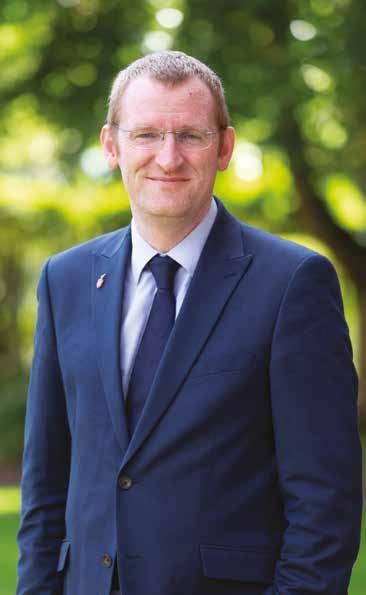
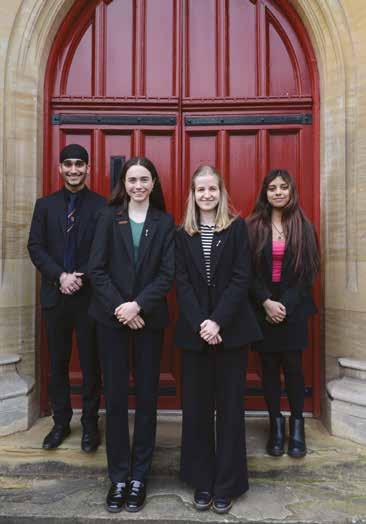
An impressive 100% pass rate on A Levels in 2024
69% of entries gaining A* - B and 40% A*/A
• Highly qualified specialist staff teach small class sizes in Sixth Form allowing for personalised learning experiences.
• Mentoring schemes support students to help them reach their full potential.
ofentriesgainingA* -B ofentries gainingA*/A 69% 40%
Students continue their studies at university on a wide range of degree courses and on prestigious degree apprenticeships.
Over half our students progress to Russell Group universities with yearly success with Oxbridge.
• Our qualified and experienced Careers Adviser offers continual support throughout the two years including personal statement writing, applying through UCAS and applying to degree apprenticeships.
• Our Oxbridge Coordinator, form tutors and subject teachers all support students through the process of applying to Oxford and Cambridge through coaching and administering entrance tests.
• A Mock Interview Evening is held with staff from other schools and local universities to provide guidance and support.
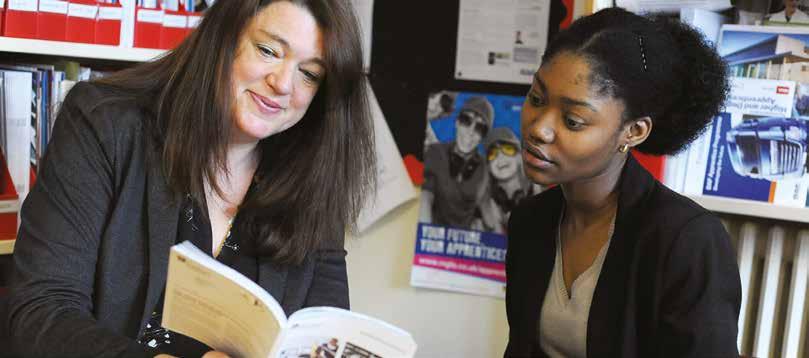
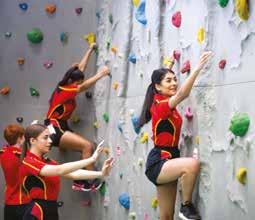
• With over 90 activities to choose from, we offer a vibrant array of co-curricular activities. Please see our Senior School Co-curricular brochure for more information.
• We also offer the Extended Project Qualification, Gold Duke of Edinburgh Award, Vex Robotics and a Medical Society.
• Plenty of leadership and collaboration opportunities in fundraising, peer support, student council and events management.
• The House System is at the heart of our school and students enjoy competing in various events and competitions throughout the year.
• Individual support from the Sixth Form Learning Mentor including tutor support and pastoral care where needed.
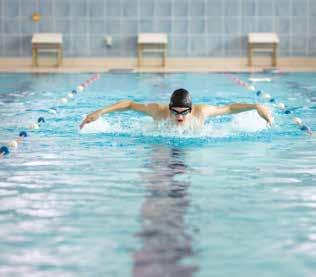
• Ongoing support and mentoring is always available to help overcome barriers or issues. Students have access to numerous tools and strategies to help them study effectively.
• Our purpose built Sixth Form Centre has its own garden, café, study area, suite of computers and common room. Located over the road from the main school site, the Centre provides an environment that embraces and encourages collaboration and hard work.
• The main school site has a wealth of superb facilities including a 25m swimming pool, climbing wall, state-of-the-art gym and playing fields.

Most students study three A Level subjects usually delivered through six periods per subject per week.
Some students will study four A Levels and undertake their EPQ in Upper Sixth.
We endeavour to manipulate the timetable around student choices*.
Class sizes range from five to 14.
This is generally studied in Lower Sixth unless four A Levels are being studied. Highly regarded by both employers and universities, each EPQ is unique, so a fantastic talking point at interviews.
The EPQ is an enriching and engaging opportunity for students to research a topic of their choice. Findings are presented as an extended essay or by creating an artefact with an accompanying report. This builds independent learning skills such as planning and research as well as critical and original thinking. The EPQ is offered to students who take 3 A Levels and score a grade average of 6.0 or higher at GCSE.
This takes place two periods a week. Students can represent the School in Rugby, Hockey, Netball, Cricket, Athletics and Cross Country. The multi-sport option includes Basketball, Handball, Dodgeball, Swimming, Table Tennis and Badminton to name just a few.
Volunteering takes place on a Friday afternoon giving students the opportunity to gain soft skills, enhance their CV and give back to the local community. Students arrange placements working in the community including at primary schools, charity shops and museums.
*Every effort is made to ensure each A Level course runs but with such a broad range of subjects on offer, reduced lesson allocation may be introduced if student numbers drop below five. In very rare cases, low take-up may mean a course is not viable. We offer flexibility with some subjects by sharing teaching with Bablake School.
We have designed an enriched academic path for our students which includes a choice of three A Levels from a broad range of subjects. This is complemented with the Extended Project Qualification (EPQ), Extended Studies, guided private study, independent study periods, Games, volunteering and a Personal, Social and Health Education programme.
Personal, Social and Health Education
Independent study periods provide an essential part of the Sixth Form provision. Students complete some time in supervised study sessions with our dedicated student manager who will help develop the disciplines and skills required and support students by designing an individual study plan.
During one period a week we offer a broad range of enrichment opportunities including Philosophy, Italian, Maths for Biologists, Modern Dance, First Aid and Self Defence.
Fortnightly sessions are delivered by tutors or visiting speakers and include topics such as CV writing, personality profiling, time management, health issues, relationships, introduction to UCAS and SACU, mindfulness workshops and much more.
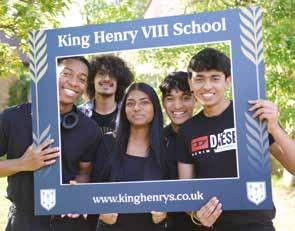
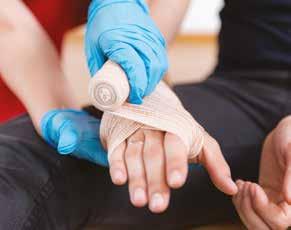
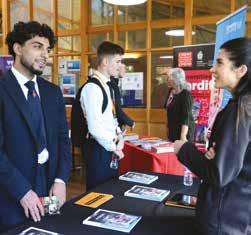
Exam board: OCR
Head of Department: Miss A Burton
A Level Art allows you to develop an exciting and extensive range of creative and technical skills. You build up a personal body of evolving practical work, guided and supported by your teachers. Individual exploration and development of your skills and creative direction is a special aspect of this subject.
“Art A Level has developed my fine motor skills, hand-eye coordination, problem solving skills, lateral thinking, complex analysis and critical thinking skills.”
STUDENT
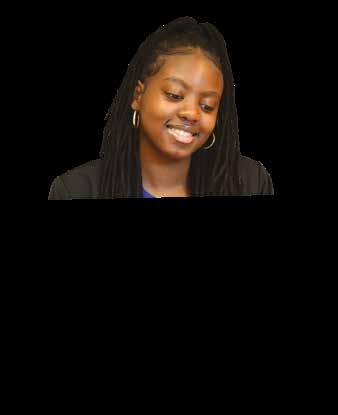
You will produce two major pieces of assessed work. The first is a Personal Investigation, which allows you to devise and put together a personal body of creative coursework, including extensive practical work, a 3,000 word illustrated essay and a Final Piece Project.
The second practical component is a themed set task known as the Timed Test. Previous themes include: Circles and Curves; Backstage – The Theatre; and Architectural Façades. You will have three months to work extensively on your chosen theme, and then sit a timed test over three days for a total of 15 hours to create and complete your Final Piece.
The Creative and Cultural Arts industries express and reflect the importance of creativity and culture in our society. All around us artists create the world we inhabit and contribute to a thriving and important industry which has a vast range of exciting career options and choices including:
• Fine Art
• Fashion Design
• Graphic Design
• Architecture
• Photography
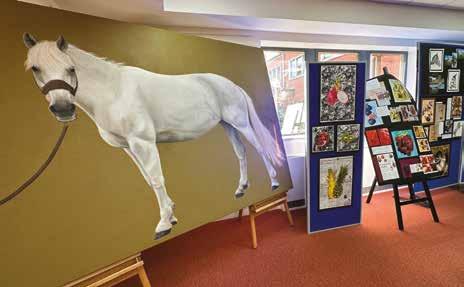
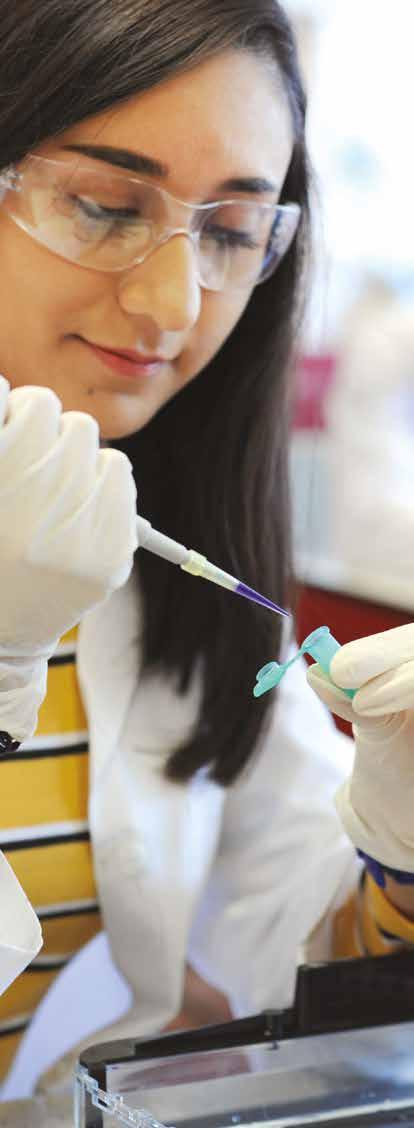
Exam board: OCR Head of Department: Dr D Norman
Biology is essential to the understanding of many areas from the molecular basis of life to the study of whole ecosystems. You will gain an awareness of contemporary issues whilst developing practical, manipulative and observational skills, and the ability to interpret and evaluate data.
• Foundations in Biology
• Exchange and Transport
• Biodiversity, Evolution and Disease
• Communication, Homeostasis and Energy
• Genetics, Evolution and Ecosystems
• Medicine/Dentistry/Veterinary Science
• Research e.g. Clinical, Pharmaceutical, Genetics
• Science Journalist/Communicator
• Conservationist/Ecologist
“I really benefited from the additional revision and support sessions, alongside extension activities such as participating in the Biology Olympiad.”
STUDENT
Exam board: OCR
Head of Department: Mr N
Meynell
In this A Level every topic you study will relate to businesses and products that you already know from Beats x Fendi, Coca- Cola, Google, Burberry and Amazon, and some you probably don’t know such as Semco and Real Burger World. It is an exciting and dynamic subject as the business environment is constantly evolving.
• Marketing and Finance
• Operation and Human Resource management.
• Entrepreneurship, leadership and strategy
• External influences and global business issues
• Banking, finance and accounting
• Business and management
• Human resources and marketing
• Exciting new business startup!
“Business
gives you unique skills that you can use in any job and in everyday life. It opens many doors and gives you a whole host of opportunities”
STUDENT
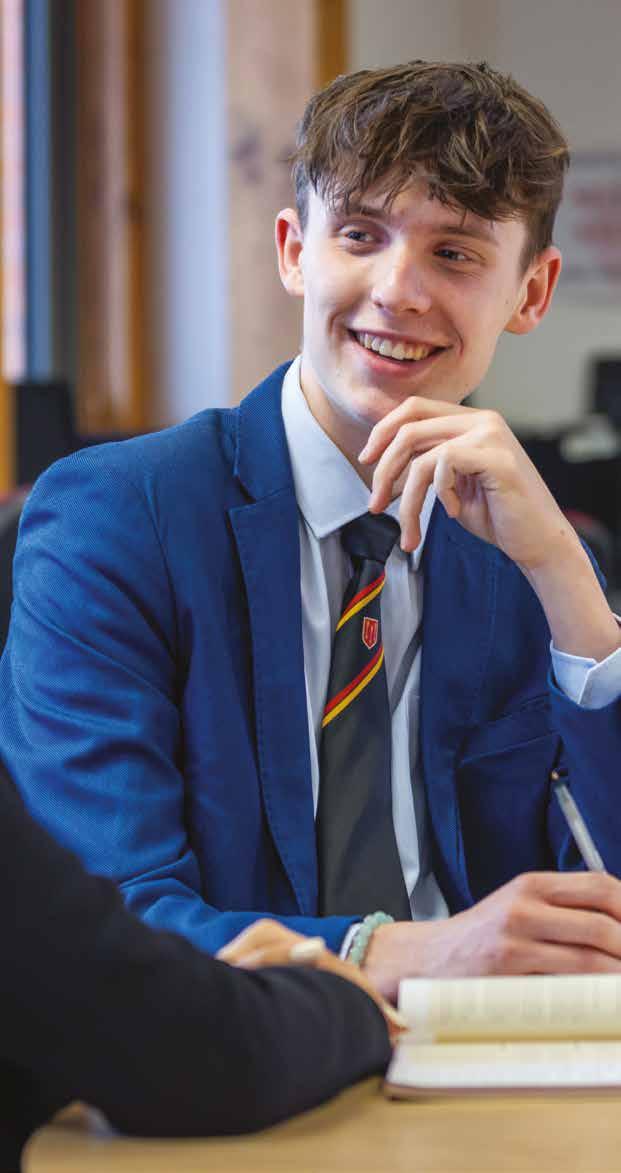
Exam board: AQA
Head of Department: Mrs K Whitehead
Chemistry is an interesting and challenging subject that will broaden your understanding of everyday materials and significantly enhance their problemsolving abilities. It is a highly respected A Level by universities for any numerate courses and many others. We also provide support for national competitions including the Olympiad and Cambridge Lower Sixth Chemistry Challenge.
• Organic Chemistry: Carbonyls, alcohols, benzene, amines and amino acids
• Inorganic Chemistry: periodicity, transition metals, redox and catalysis
• Physical Chemistry: pH, kinetics, equilibria, thermodynamic
• Medicine, Pharmacy and other medical professions
• Chemical industry, material science and engineering
• Any numerical problem solving profession from law to accountancy.
• Analytics, forensics and research

Exam board: OCR
Head of Department: Mr N Jones
Explore the civilisations from which modern Europe emerged and unlock the wisdom and secrets of some of the most renowned philosophers that ever lived with Classical Civilisation. You will grapple with powerful and exciting texts that have shaped culture and ideas for time immemorial.
• Greek and Roman Epic – the Odyssey and the Aeneid (what all modern literature comes from).
• Augustus – how he uses propaganda to establish his reign.
• Late Republic – politicians with massive egos and a refusal to compromise.
Classical Civilisation is an academic A Level that makes your CV stand out and shows employers that you can research, evaluate ideas, analyse and make arguments. You may go on to a wide range of careers including medicine or law.
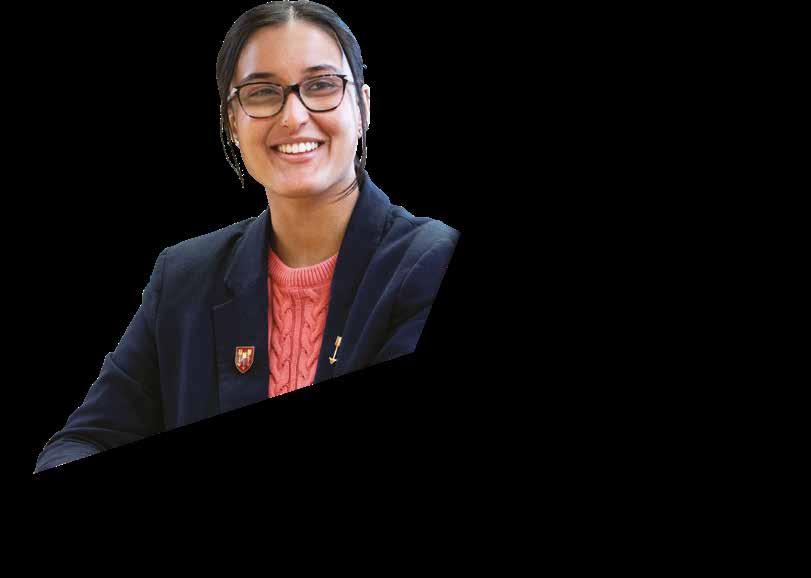
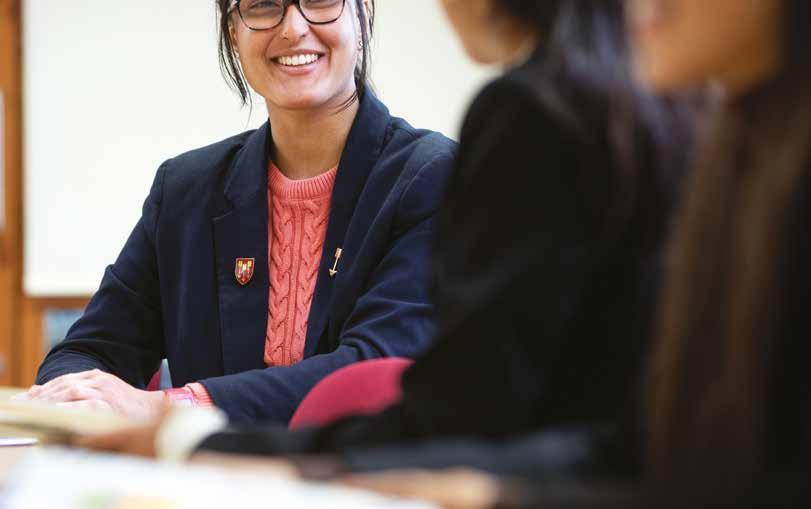
“The best thing is how even though it’s over 2,000 years old, it’s all so relevant to now.”
STUDENT
Exam board: OCR
Head of Department: Mrs S McCunn
Computer Science is a modern course for a modern world. If you want to create your own software, build the next best selling app, or design and implement IT systems then this is the A Level for you. You will study theory as well as lots of practical programming.
• In-depth understanding of how computer technology works and a look at what goes on “behind the scenes”.
• Computational thinking, analysis and problemsolving skills through the study of computer programming.
• An independent programming project where you could create a game, use AI or create a fully working website… the choice is yours.
Computer scientists are needed in every type of industry
• Mobile App Developer
• Software or Data Engineer
• Cyber Security Expert
“It’s the only A Level which relates to real life! It looks great on your CV.”
STUDENT

Exam board: AQA Head of Department: Mr A Rendle
At A Level, you get the opportunity to work for ‘live clients’, encouraging a greater depth and understanding of the important role Design and Technology plays in every part of our lives.
You will produce commercial quality projects, engage collaboratively with professionals and work to the tight deadlines that you will later experience in university and employment.
This A Level is also one of the best subjects for teaching project management, teamwork and innovative problem solving skills which are in high demand.
“I love the challenge of designing for real clients, solving real problems and working on complex solutions; the possibilities are endless.”
You will develop your analytical skills, broaden and deepen your understanding through practical and theoretical study. You will make full use of modern materials and technology, including the use of 3D printing for rapid prototype work. The design process mirrors that which is used in industry to allow you to understand fully how professional designers and engineers work.
The application of technology will only keep growing so it’s a vital subject for the future job market and the opportunities following a Design qualification are endless. Whether you choose to take an Engineering route or follow a more creative path, the background understanding of complex design approaches to problem solving are entirely transferable to any career path.
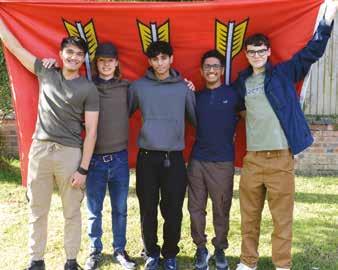

Exam board: AQA
Head of Department: Mr A Raffle
This A Level combines practical and theoretical learning and will develop your performance, directing and/or design skills, academic writing and independent thinking.
It is a great choice if you want to actively develop confidence, improve your presentation skills, interview technique and public speaking ability. There are a range of pathways: acting, set design, lighting design, sound design, costume design, puppet design or a combination route. There is an exciting, creative and dynamic syllabus, with texts tailored to suit you.
• Devised performance – Creating, scripting and staging an original performance piece (as an actor, director or designer).
• Scripted performance – Staging extracts from scripted plays in groups (as an actor, director or designer).
• Live Theatre – Analysing and evaluating live theatre, following trips to see shows.
• Set Texts – Two texts explored practically and theoretically from the perspective of performers, designers and directors.
Employers recognise that Drama students are collaborative, creative and problem solvers.
• Theatre, Film and Television – Performance, Direction, Design, Production.
• Communications, PR, Media and Marketing.
• Government, social welfare, drama therapy.
• Education – community and adult education, primary, secondary, college, HE.

“This A Level has helped with my confidence in my writing ability and in my public speaking. It has really developed me as a person.”
Exam board: AQA
Head of Department: Mr N Meynell
Economics A Level is interesting, topical and works with a wide range of Arts and Science A Levels. It will develop your analytical and evaluative skills – top Economists are very sought after.
• Supply and demand, the market system and market failure.
• The UK economy.
• Labour markets, poverty and inequality.
• Behavioural economic theory and global economic issues.
• Banking and finance
• Accounting
• Business and management
“Economics definitely requires you to think in a different way to any other subject at A Level.”
STUDENT
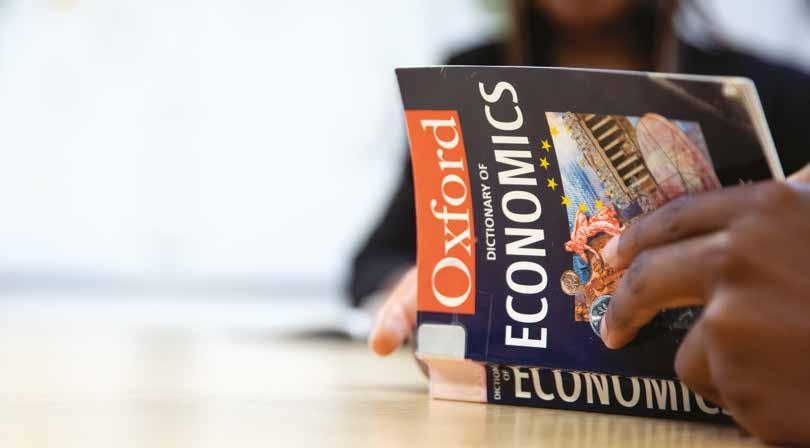
“The
skills you acquire through Economics will be relevant to your whole life, whether you choose to study it beyond A Level or not.”
STUDENT
Exam board: AQA
Head of Department: Mrs L Collett
Written and spoken communication is at the heart of this course - studying how we use and shape language for a particular audience and purpose.
• How meanings and representations are conveyed.
• How gender influences language use.
• Child language acquisition.
• English as a global language
• Journalism
• Education
• Law
• Human Resources
“Studying English Language has made me think more deeply about the type of words I use in certain situations.”
STUDENT
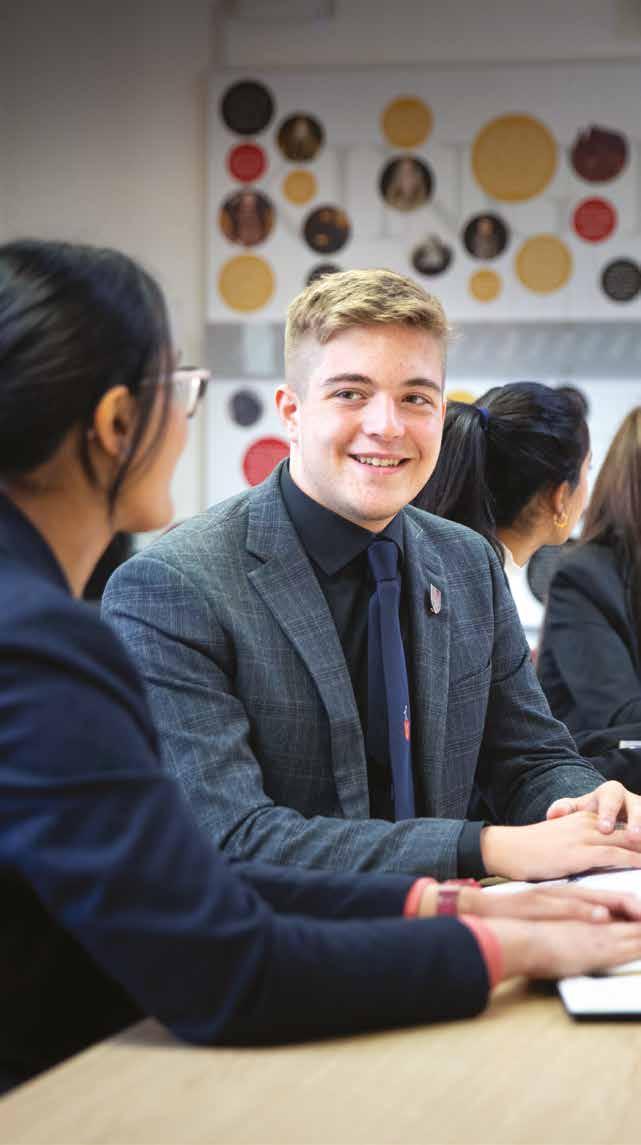
Exam board: Edexcel
Head of Department: Mrs L
Collett
If you are fascinated by the influences upon an author and how the content of the text is shaped and presented then this A Level is for you. You will study a wide range of texts and take part in stimulating lessons based around discussion and debate.
• Shakespeare and one other drama.
• Comparative and contextual study of two novels.
• Post 2000 and pre-1900 poetry.
• Comparative coursework on two texts.
• Journalism
• Marketing
• Media
• Publishing
• Human Resources
“I
loved analysing the novels, the poetry, researching the context… most of all, I really enjoyed our discussions about the texts and sharing ideas.”
STUDENT
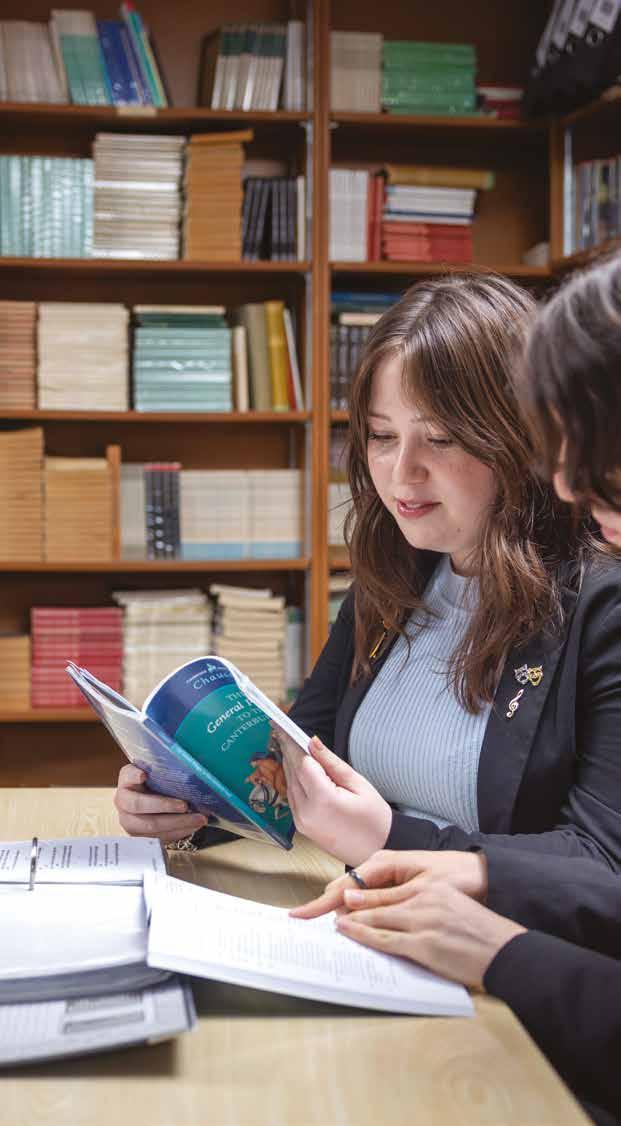
Exam board: AQA
Head of Department: Mrs E Bains
French is the world’s third most important business language (after Mandarin and English) and is one of the highest traits sought by employers. You will learn more about French culture, music and politics and have a greater understanding of what it is to be a French citizen.
Lower Sixth:
• Aspects of French-speaking society – the changing nature of the family; the digital world; the place of voluntary work.
• Artistic culture – the cultural diversity of France and its heritage; contemporary francophone music; cinema.
• Film analysis
Upper Sixth:
• Aspects of French-speaking society – positive features of a diverse society; life for the marginalised; how criminals are treated
• Political life – teenagers and the right to vote; demonstrations and strikes; politics and immigration.
• Literary text
Future Careers
• Banking and finance
• Transnational sales and marketing
• Speech therapist
• United Nations

Exam board: Cambridge International Examinations
Head of Department: Mrs M Griffiths
Whoever we are, and wherever we live, we all inhabit Planet Earth. Through the study of the processes that affect both our human and physical environments, Geography will help you understand where we live at a range of scales. In these unprecedented times of climatic and political change, it has never been more relevant. Our exciting field trips directly support the syllabus and include locations such as York, Sicily and Iceland.
Core Physical Geography:
• Hydrology and fluvial geomorphology
• Atmosphere and weather
• Rocks and weathering
Core Human Geography:
• Population
• Migration
• Settlement dynamics
Advanced Physical Geography:
• Coastal environments
• Hazardous environments
Advanced Human Geography:
• Environmental management
• Global interdependence
Studying Geography will develop the highly transferable skills of research, data collection and presentation, analysis and evaluation. These skills will help you access specifically geographical jobs such as cartography or geology, but are useful in careers such as journalism or finance.
“The field trips were amazing and really opened my eyes to the wider world.”
STUDENT
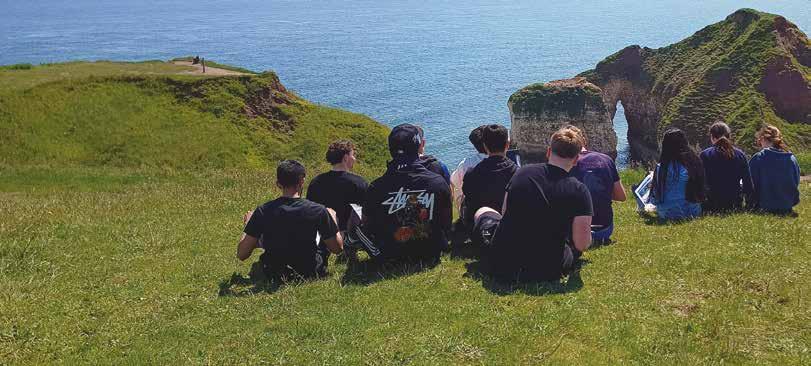
“The skills I learnt in my Geography A Level have helped me so much on my University course.”
STUDENT
Exam board: AQA
Head of Department: Mrs M Llabani
In German A Level you will have the opportunity to explore Germany through its culture, media, history and literature.
• Aspects of German-speaking society, the changing nature of the family, the digital world and youth culture including fashion, television, the media and the internet.
• Multiculturalism; racism, integration and immigration.
• Artistic culture and political life of Germany. Art, Architecture, Festivals, Theatre and Berlin.
• Literary text – der Besuch der alten Dame by Friedrich Dürrenmatt.
• Film analysis – das Leben der Anderen directed by Florian Henckel von Donnersmarck (2006).
• Journalism and broadcasting
• Business, accountancy and finance
• Government and diplomatic service
• Tourism, marketing and media
• Interpreting or translation
• Scientific and medical research, companies such as Siemens, Bosch or Bayer
• Engineering, especially in the automobile industry with firms such as BMW, Audi, VW or Mercedes
“Learning German has allowed me to hone my communication skills and deepen my understanding of the country through History, Media, Literature and Film.”
STUDENT

Exam board: OCR
Head of Department: Mrs M Gould
Historians are the custodians of the human experience: a thin line between politicians, journalists, and their abuse of the past.
You will learn crucial skills of analysis, evaluation and debating. The topic based essays offer a real opportunity to study the History that you love: you chose the subject and we guide you through the process. We believe in creating students who are historians, who possess the skills needed to navigate the ever-changing world around us.
• England 1485-1558: The Early Tudors and the Mid-Tudor Crises (British Depth Study)
• The American Revolution 1740-96 (Wider World Study)
• Russia and its Rulers 1855-1964 (Thematic Study)
• Essay based on a topic of your choice
History is seen as a facilitating subject by Russell Group Universities, a subject that offers a wide variety of skills suitable to future study and future careers.
Future careers are varied, from teaching and the heritage industry, to the more exotic, campaign management, marketing, journalism and law.
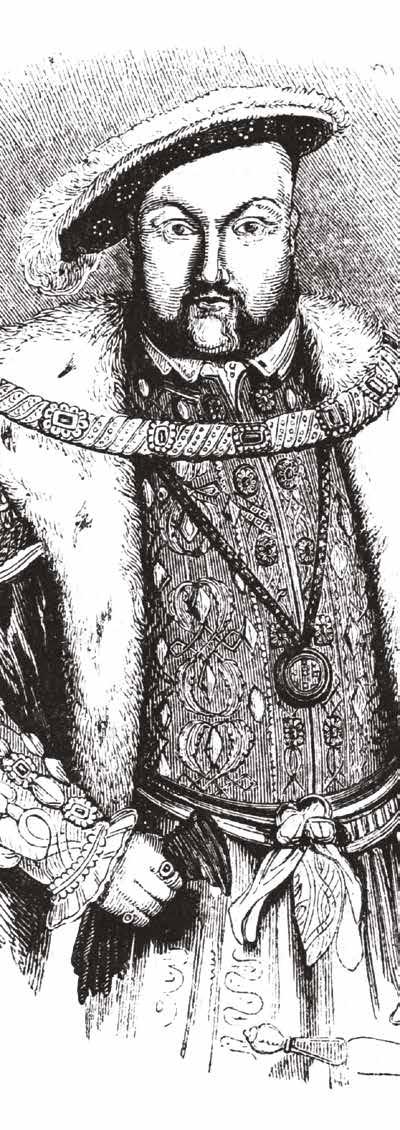
Exam board: OCR
Head of Department: Mr N Jones
Latin is the language of law, government, logic, theology and medicine. It will challenge you and make you stand out from the crowd.
‘It’s great knowing we learnt the grammar at GCSE so I can now practise using my knowledge.’
STUDENT
• Language similar to GCSE but closer to authentic Latin
• Virgil, Ovid, Catullus – the greatest poetry ever written
• Tacitus, Suetonius
Latin is a subject which makes your CV stand out.
• Medicine and the Sciences
• Law and Political Science
• Vet, Journalist, Physicist, Accountant

They can, because they think they can.
VIRGIL
Exam board: OCR
Head of Department: Mr D Lovell
Law A Level will develop your skills in problem solving, analysis and application. We have a great programme of trips, activities and guest speakers to bring the subject to life. It is an excellent foundation for a Law degree or to support higher level studies in many other subjects.
Topics Studied
• Legal system and law making
• Criminal law
• Tort law
• Contract law
Future Careers
• Barrister/Solicitor
• Politics
• Business/Management
• Criminology/Forensics
“I loved taking the role of a barrister in the mock trial competition at Birmingham Crown Court. It brought my study of the criminal justice system to life and allowed me to put some of the criminal law theory we had studied into practice.”

Exam board: OCR
Head of Department: Dr S Barge
Mathematics is the language that reveals the secrets of the universe. This A Level builds on and extends the concepts learned at GCSE. You will learn essential skills such as application of logic, reasoning and problem solving.
• Pure Mathematics, the secrets of algebra, calculus, trigonometry and how to apply them
• Mechanics – modelling the Newtonian world through kinetics, projectiles and forces
• Statistics – understanding the chaos of the modern world via probability distribution and hypothesis testing
• Scientist
• Engineering
• Economist
• Accountant

Exam board: OCR Head of Department: Dr S Barge
Expand your knowledge of the universe still further with the more challenging Further Mathematics. Learn the most important result in history: e^iπ+1=0.
This A Level is an essential requirement for many courses at the top universities and can make the first year of a Mathematics degree more accessible due to the topics covered.
“Further Maths has really supported my science subjects, especially Physics.”
STUDENT
• Further Pure Mathematics – complex numbers, differential equations and hyperbolic functions.
• Further Mechanics – circular motion and centres of mass.
• Further Statistics – chi-squared tests and expectation algebra.
• Discrete Mathematics – algorithms, graph theory and game theory.
• Mathematician
• Research Scientist
• Economist
Exam board: AQA
Head of Department: Mr R Newton
Be part of a wonderfully dynamic and exciting department, developing skills across a huge variety of areas in a creative, stimulating subject.
You will learn a mix of practical and cognitive skills in a deeply engaging subject that embraces diverse topics. Our Music Department has vast experience in education and professional music arenas.
• Composition comprises writing two pieces - one free and one to a brief. The briefs are connected to the different areas of study represented in the listening paper.
• Performance is a crucial part of A Level Music. Students have to perform a ten minute recital of Grade 7 or 8 repertoire.
• Composers including Mozart, Shostakovich, Sondheim, Bach, Beyoncé and many more...
You will develop skills in many areas - teamwork, self-management, creativity, analysis, problem solving - all highly valued by employers.
Music opens you up to a wide range of university and career choices including:
• Performance, arts administration, broadcasting, teaching
• Law, medicine, politics, Civil Service

“Every music lesson was an adventure!”
Exam board: OCR
Head of Department: Mr C McKee
The scientific study of exercise, health and sport is big business, from the riches of professional sport to the equally important personal fitness sector. The impact of sport on both our individual lives and the global economy cannot be overstated.
Physical Education enables you to analyse the sports you love in great detail and thereby improve your own performance. The wide range of theory will be applied to practical performance making it specific to your learning.
• Sports Performance, Evaluation and Analysis
• Contemporary Issues in Physical Activity and Sport
• Sport in Society
• Biomechanics
• Sport Psychology
• Skill Acquisition
• Exercise Physiology
• Anatomy and Physiology
Future Careers
• Physiotherapist
• Sports Therapist
• Sports Psychologist
• PE Teacher
• Exercise Physiologist
• Sports Technology Developer
• Sports Analyst
• Sports Development Officer
• Professional Performer
• Sports Coach
• Fitness Industry
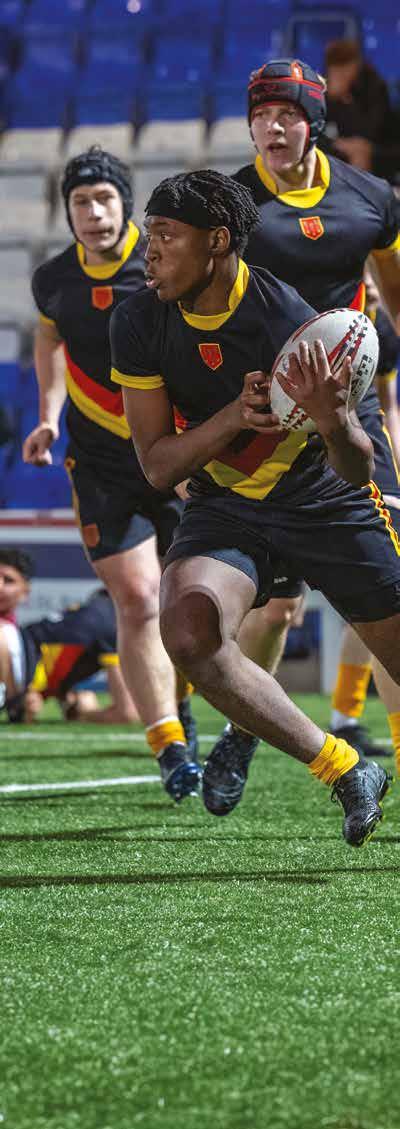
A Level PE is a subject that has a practical application. I found that whatever I learnt in lessons, I then use to improve my own sports performance. This has helped me understand each topic in more depth.”
Exam board: AQA Head of Department: Mr J Moyes
Physics lets us stare deep into the universe and see its internal workings. It has come a long way in the last century and new ideas are constantly emerging. The skills you develop within Physics A Level are highly regarded by universities and employers alike.
• Particle Physics and Quantum Phenomena
“The Sixth Form trip to CERN is an amazing experience to see Physics applied in the real world.”
• Mechanics
• Electricity
• Waves
• Physics, Astrophysics, Geophysics
• Engineering
• Medicine
• Finance
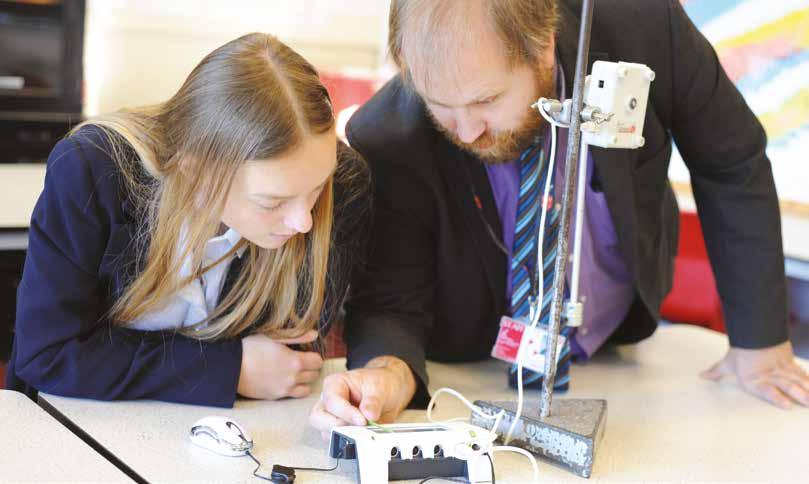
Exam board: Edexcel
Teacher in charge: Miss S
Burton
Ever watched the news, and wondered how and why events are happening? It is only through analysing the systems and philosophies that lead to these outcomes that we can truly answer these questions. If you are curious about global and domestic current affairs then Politics is the subject for you. You will build skills in using evidence to unlock theory, evaluate and construct well justified conclusions.
• Government and politics of the UK and the USA, making comparisons between the two systems, using current affairs to see how these systems operate in practice.
• Political ideas such as conservatism, liberalism, socialism, and ecologism, with in-depth study of key thinkers such as Ayn Rand, John Stuart Mill and Karl Marx to name but a few.
Students go on to study a wide range of degree courses, nationally and internationally, since by its very nature it teaches us to engage with the world around us. It is well regarded by both Russell Group and Oxbridge universities. Common pathways include:
• Politics and International Relations
• Civil Service
• Journalism
• Law
• Marketing

“Politics is a great subject to help develop your conversational and debating skills as well as sparking an interest when it comes to having your say in the very near future.”
Exam board: EDUQAS (WJEC)
Head of Department: Mr P Manning
Why are you the person you are? Why do those around you do what they do? Psychology is the study of how we perceive, experience and react to the world around us through the brain and mind.
This A Level trains you to think like a Psychologist through its focus on five different theoretical approaches. You will develop research skills as you carry out experiments, learn to make informed judgements on complex issues and write with clarity and sophistication. Within the UK, Psychology is the fourth most popular degree subject and highly regarded by many employers.
• Theoretical Perspectives: biological, psychodynamic, behaviourist, cognitive, and positive
• Explaining relationships and other human behaviours
• Scientific research methods in Psychology
• Applying Psychology to an understanding of Schizophrenia, Stress, Bullying and Criminal Behaviours
The applications of Psychology to future careers are many and varied and range across marketing and human resources in the business world. It is also a valued asset for medicine and health care career pathways.
There are many specialist careers it can lead to including criminal psychologist, clinical psychologist, counselling, academic research and teaching to name just a few.
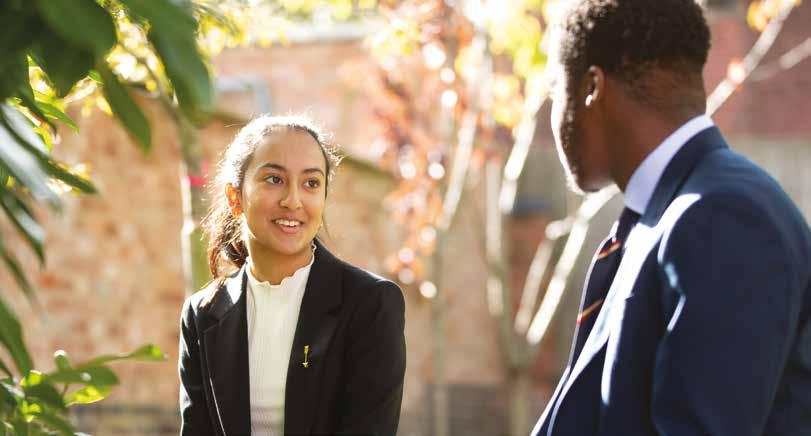
Exam board: OCR
Head of Department: Mr P Bond
Religious Studies allows you to explore questions posed by philosophers throughout history, concerning the purpose and meaning of existence and the reasons why we have an ethical system. You will develop a range of skills including analysis and evaluation, and will examine a variety of perspectives in order to reach a justified and informed conclusion.
• Philosophy - Greek philosophical influence, arguments for and against the existence of God and the issues of experience and language.
• Ethics - ethical theories both religious and non-religious, their application to euthanasia, business and sexuality, as well as the validity of ethical discourse itself.
• Developments in Christian Thought - a Theology unit including topics such as human nature, moral principles and actions, as well as the modern world, incorporating ideas such
This is a highly regarded subject, and past students have pursued a huge range of subjects at Russell Group and Oxbridge universities. Common pathways include:
• Law
• Medicine
• Politics
• Business
• Creative Arts
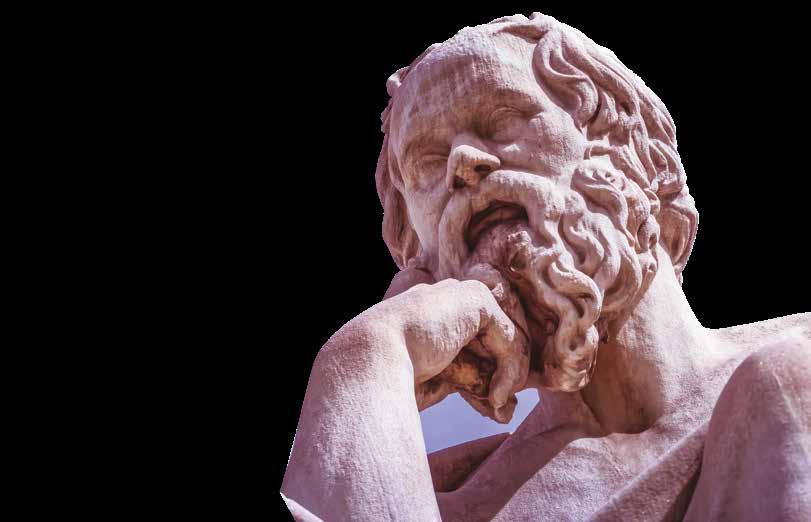
“RS at its core helps you to engage with why humanity and society are as they are, and how they should be.”
STUDENT
Exam board: AQA
Head of Department: Mrs M Hussein
If you love travel, Spanish is great. It is spoken in 20 countries and by 450 million people - a whole new world to explore. Whether you wish to study the language and its heritage or study languages as a complementary component as part of your degree course, Spanish is an exciting and impressive qualification that makes you stand out from the crowd.
• Aspects of Hispanic society – modern and traditional values; cyberspace; equal rights.
• Artistic culture – modern day idols; Spanish regional identity; cultural heritage or cultural landscape.
• Literary text – La Casa de Bernarda Alba.
• Aspects of Hispanic society – immigration; integration; racism.
• Political life – today’s youth, tomorrow’s citizens; monarchies, republics and dictatorships; popular movements.
• Film analysis – El Laberinto del Fauno.
Languages don’t just lead to a career but make a great addition to any future profession.
• Translator/interpreter
• Foreign language intelligence
• Global social media coordinator

“It’s a bit strange at the end of a lesson when you realise you are sat in a classroom as you feel as though you’ve been transported to the Spanish speaking world!”
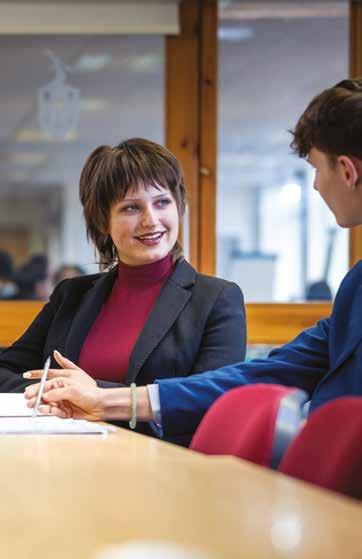
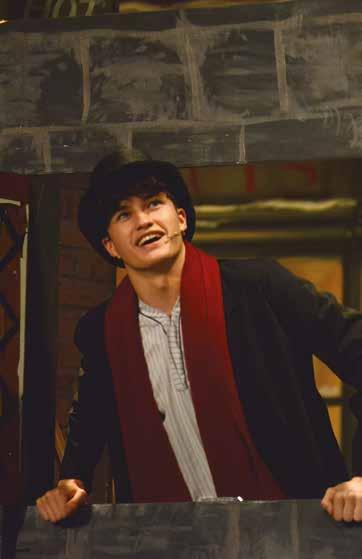
We usually recommend 5 GCSEs at grade 6 or above, with grade 7s preferred in those subjects being taken at A Level. This is to support our students in achieving their fullest potential.
The Headmaster and his team will be happy to discuss subject choices and offer their personal recommendations based on current grade predictions. Some subjects require a grade 7, including Biology, Chemistry, Maths and Physics. Further Maths requires a grade 8.
Students who wish to study four subjects at A Level must have an average of 7.5 across all GCSEs.
Offers are confirmed once GCSE results have been published.
ACADEMIC SCHOLARSHIP
Applicants should be capable of, and on course to achieve, grades of at least 8 and 9 in all subjects at GCSE that are intended for Sixth Form Study, as demonstrated by the predicted grades provided by their present school. Students should have made a full contribution to the life of their current school.
MUSIC SCHOLARSHIP
Students applying for a Music Scholarship should be able to demonstrate a wide involvement in musicmaking within their present school and ideally in the wider community. Successful candidates will be expected to show ability and enthusiasm to take a leading role in the musical activities of the school.
SPORT SCHOLARSHIP
Applicants must have the academic ability to succeed within the Sixth Form and be able to demonstrate a wide-ranging contribution to school sport in two or more sporting activities.
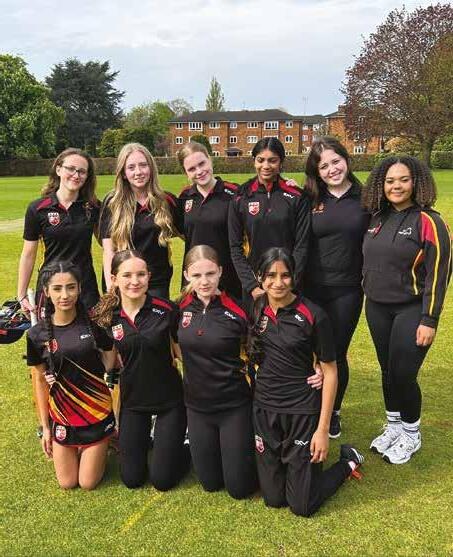
Bursaries are means-tested and awarded based on financial need and academic ability. They are offered to students whose parents can contribute to fees but who are unable to meet the full fees.
Bursaries which are already held by current students are continued into the Sixth Form, subject to the usual assessment of income and any other rules governing these schemes.
Further information can be found on our website or by contacting our Admissions Team on 024 7627 1190.